Adaptive Democracy
Why do elections have deadlines? Why do we have a big event where everyone votes for a few days, and then have to live with the results for years?
An elected official is just an employee of the people. If a private company can hire or fire employees essentially at will, why can't we replace our elected officials at will? Certainly there are logistical questions to consider, and not all decisions are so easily reversible. But does every election have to have a deadline? Especially for private organizations like clubs or cooperatives where the stakes aren't as high as government, could we make some decisions more fluidly?
Most of us have never even thought to ask questions like these. It's "just how it is" for elections to have deadlines, we can't imagine it any other way. But I want to convince you it's one of the most important questions we could ask. The fact that elections are time-limited events with an arbitrary deadline causes a huge number of problems. And I'm convinced unraveling this hidden assumption is the secret to unraveling democratic coordination itself.
Here are some deadline problems that wouldn't exist without an arbitrary time limitation.
- Voter suppression is easy. You only have to make voting difficult during a period of a few weeks at most, likely just a few days, in order to shut out large numbers of voters.
- Strategic marketing blitzes and misinformation are cheap and effective. Voting windows are short, so it's easy to spam voters and influence them with recency bias.
- Most elections get very little scrutiny from most voters. Most people only think about their county clerk a few seconds every few years.
- "Election hangovers" are common. Lots of people don't vote, or vote without thinking the result will really matter, so elections end up making decisions that most people are unhappy with.
Adaptive Voting, the main concept that underpins Adaptive Democracy, proposes that most elections aren't commitments in any meaningful sense, but are easily reversible. Using Adaptive Voting, voters can change their preferences at any time, candidates can enter or exit elections at any time, and the current winner of an election can change at any time.
Importantly, when I say any time I recognize it would be bad for the mayor to switch four times in an hour. With a few important design choices such as stabilization buckets and update cycles, we can get rid of deadline problems and get some even more exciting benefits without introducing any new serious problems.
First let's establish the basic assumptions of Adaptive Democracy, the ones that will matter in every other system:
- Each person has some supply of "voting weights" they "place" on different decisions.
- Each person can move their weights around at any time, rather than having to wait for an election event.
- Each person can use different amounts of weights to effect the outcome of different decisions, so they can put more on decisions they care more about.
- Weights are "moved" rather than "spent", so moving weights doesn't decrease how many weights you have.
It shouldn't matter exactly how many weights each person has, since weights can be split up by placing a decimal quantity such as 0.5, but obviously in a democratic society all voters will have the same amount of weights. It might however make sense for private organizations using Adaptive Democracy to give different people different amounts of weights.
There are many different ways for these weights to actually effect decisions, and different ways are better for making different kinds of decisions! But they'll all fall into two categories:
- Reversible decisions, which can use Adaptive Voting.
- Irreversible decisions that require some sacrifice, which can use Adaptive Commitments.
Adaptive Voting
Our elections for public servants such as mayors, police chiefs, sanitation commissioners, etc, are all reversible decisions. These people are just employees of our shared governance bodies, and in the same way we allow private companies to replace their employees at basically any time, we should be able to replace our public servants at basically any time.
Stabilization Buckets
As eluded to earlier, it would be inefficient and chaotic for changes to happen too quickly. We need some stabilization method that keeps the current winner from switching too quickly, and the concept of "stabilization buckets" fits nicely.
Stabilization buckets ensure elections don't change too rapidly by making a new winner hold their advantage for a period of time before becoming the new winner.
- If a candidate pulls ahead of the current winner, they begin to fill up some "stabilization bucket". They must fill up the entire bucket to become the new current winner of the position.
- If a candidate has a bigger vote advantage they fill up the stabilization bucket faster. This means the change will happen faster since the electorate is more "certain".
- If a candidate loses their vote advantage, the stabilization bucket begins to drain based on the size of the new gap.
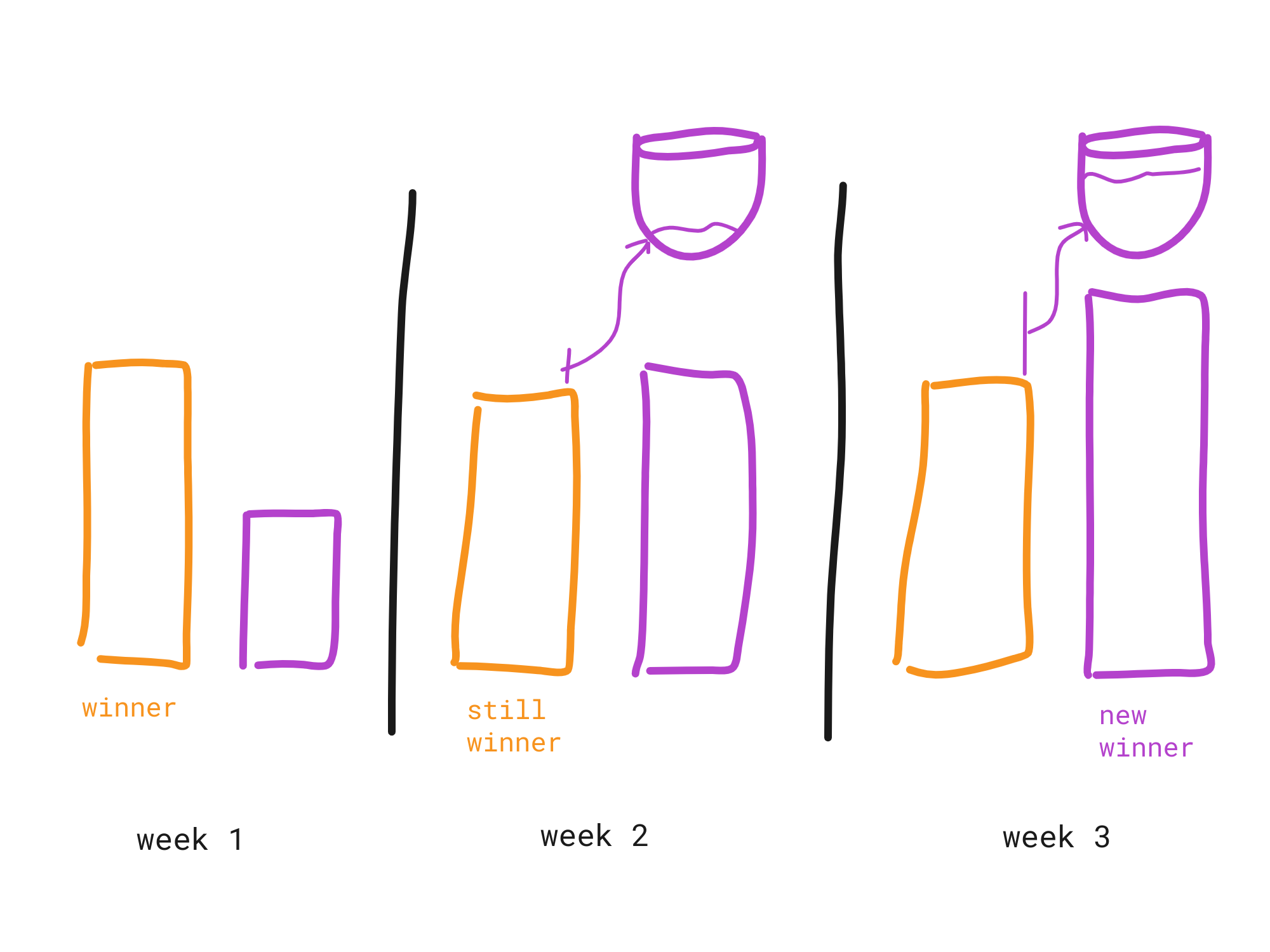
How "big" are these stabilization buckets? In general if the buckets are "bigger" they take longer to fill and the election result will take longer to change, making it more "stable". I don't have a precise algorithm for you at this point, but it seems it should follow these principles:
- If the election potentially effects more people, the stabilization bucket should be bigger.
- If the electorate is more "spread thin", meaning they have more elections they can possibly vote in, the stabilization bucket should be bigger.
Periodic Update Schedules
It also wouldn't be great for the vote differences to be published instantly, since it would be annoying and stressful for people to worry about what vote changes might be happening at all different hours.
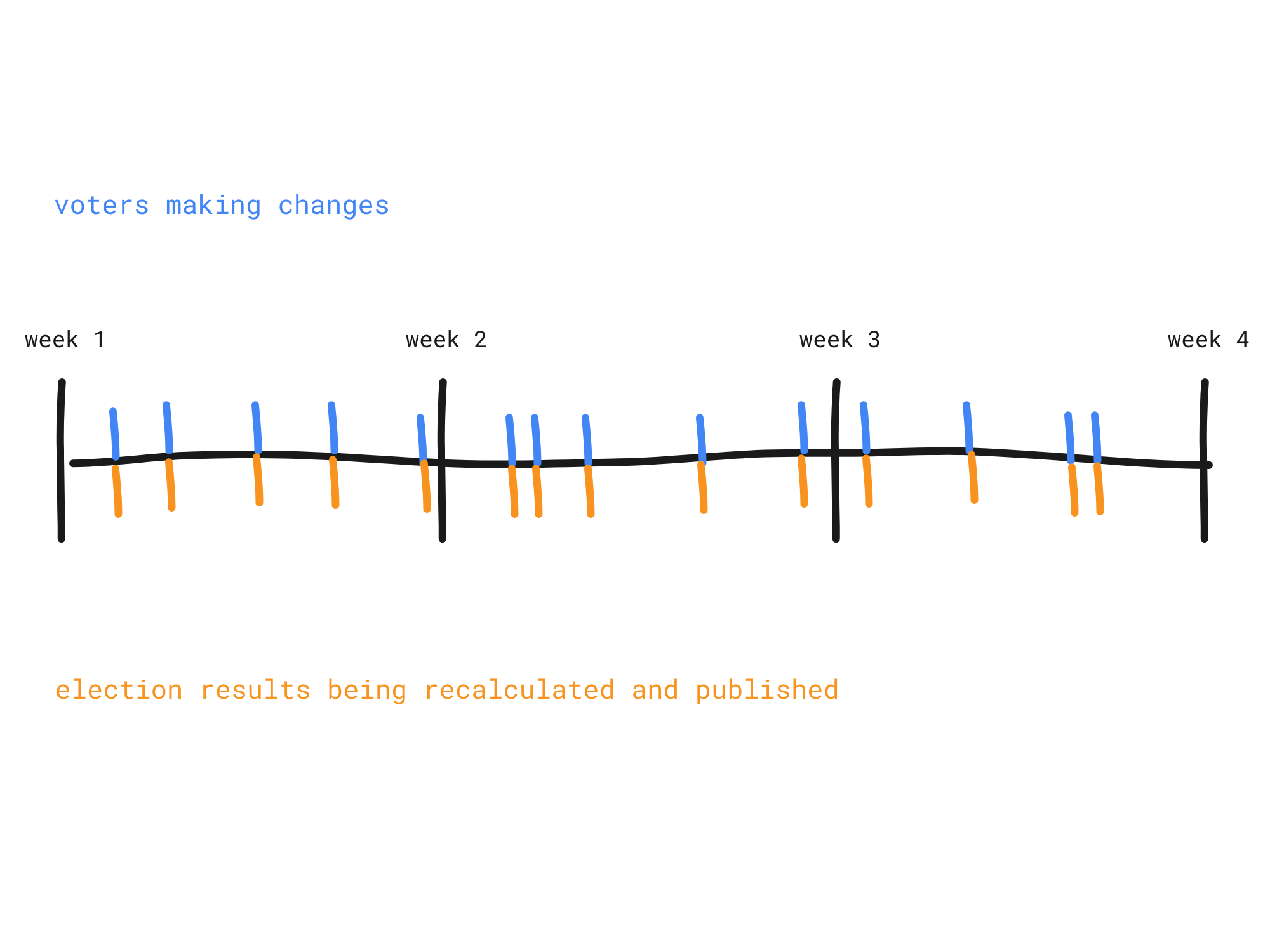
Publishing and recalculation shouldn't happen instantaneously. Electorates should be able to choose some periodic update schedule at which votes are actually tabulated and published, with all vote changes being batched until the update time arrives. This would allow each member to only worry about their votes at most one time in every update cycle.
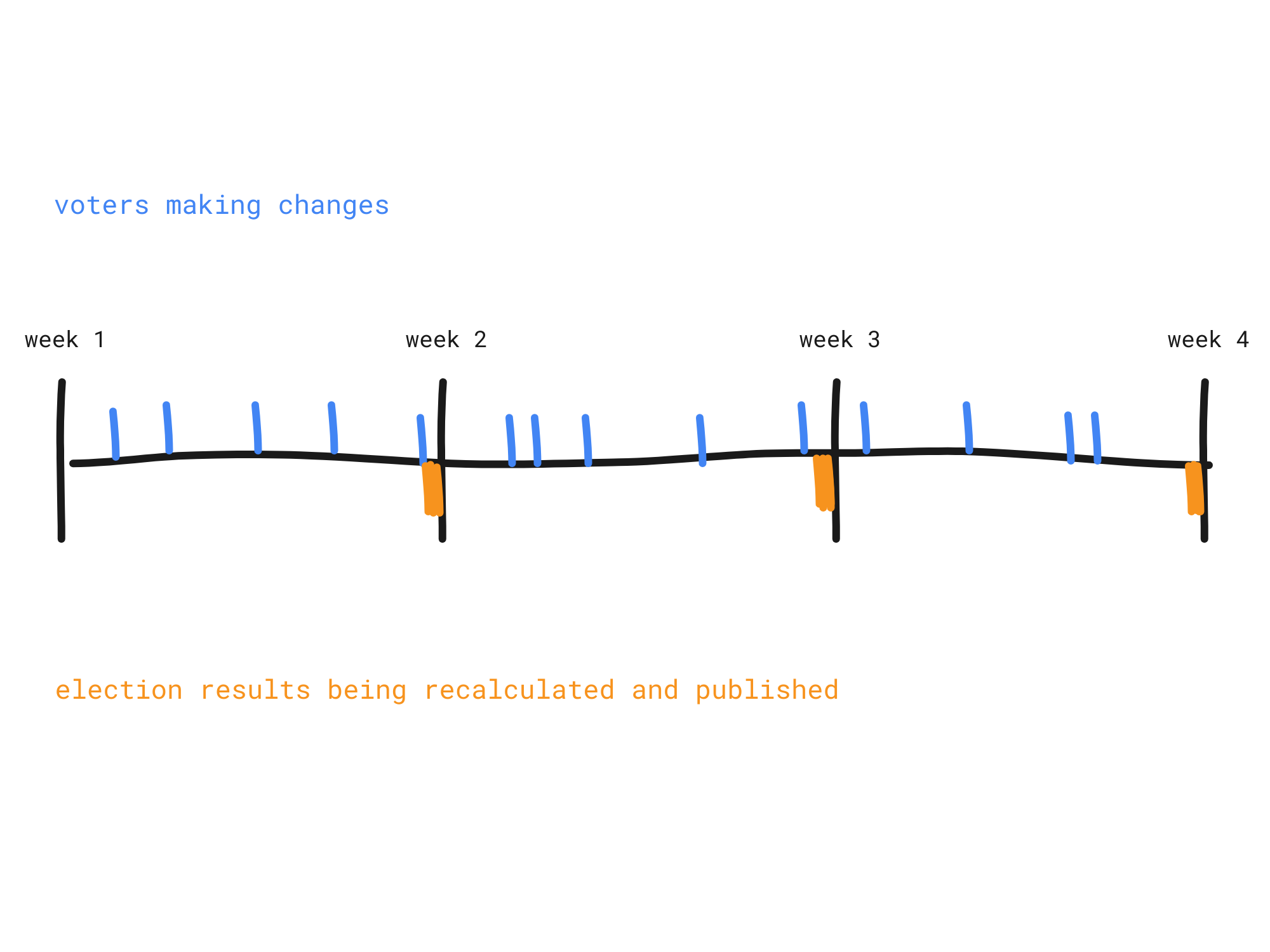
Why is Adaptive Voting exciting?
Adaptive Voting allows true direct democracy to be efficient and stable. Since voters can change their vote in any election at any time, they can participate in only the decisions they're actually concerned about while leaving other decisions for other voters. This means they can have many more possible decisions available to them without becoming overwhelmed.
It also allows "auto-pilot democracy", where low voter turnout is essentially a nonissue. If some concerned minority makes most of the electoral choices, and everyone else is perfectly fine with those choices, then the majority can just not participate without worry. If the concerned minority begins making harmful or foolish choices in some elections, the rest of society can simply move weights into those elections to override them before harm is done.
We theorize Adaptive Voting will have many massive benefits:
- Would keep elected officials much more accountable, since election seasons aren't the only times they can be replaced.
- Allows groups to more quickly discover new options and converge toward decisions that are better for everyone.
- Prevents strategic voting from causing regret or election hangovers, since negative surprises can just be counteracted before they do harm.
- Positive surprises are also much more possible, since they can be detected and reinforced more easily.
- Makes it way more expensive to "buy" an election with media blitzes or fake stories.
- Elections would be less sensitive to noise, politicking, campaigning, and predictions about the outcome.
- Would allow more complex voting methods, since voters have time to think about and understand how they wish to vote.
Adaptive Voting also inherits the benefits of resource voting systems. If a vote is cast using a scarce resource of voting weights it is much more likely a true signal of a real preference. Voting for one option comes at the exclusion of all other options, so voters will tend to use their weights only for issues of high relative concern and high relative confidence. And since weights can be used for negative votes, this allows people who are highly confident they don't find some option acceptable to still express that preference, even if they aren't sure what the right answer is. This encourages creativity and communication and persuasion and compromise to find new options that are broadly acceptable to all concerned. This would tend to dissolve "tyranny of the majority" problems, which happen when a majority who isn't actually very concerned with something casually supports it.
In general resource voting systems put a stop to "spam voting", where a voter casts a vote they aren't actually concerned with or convinced of simply because it costs them nothing to do so. It is likely many of the issues that appear violently heated in our current political environment would quickly deflate as previously zealous voters realize they don't actually care enough to sacrifice scarce votes.
But to me the most exciting benefit is that it would be reasonable to directly elect documents, such as constitutions, tax codes, legal definitions, or anything else. These elections would work just the same as those for officials, where voters nominate documents and whichever document has the current greatest amount of support is the one that's in effect.
Constitutional Adaptive Democracy
If it's possible for any voter to create, nominate, and vote for constitutional documents, this means every decision of the group can be made democratically. Constitutions define how the entire system beneath them functions, what specific decisions can be made, what elected officials there are and their responsibilities, what the broad limitations are, and everything else. Any specific decision-making tool can be chosen based on how well it fits with the decision in question.
This arbitrary flexibility means electorates can fine-tune their constitutions to strike the right balance between delegation and direct democratic control. A group can fully delegate certain decisions to an elected official and then conduct elections for that official using Adaptive Voting. They can even partially delegate responsibility to some elected official by keeping decisions in their purview open to direct democratic influence, but giving the elected official extra decision weights that can only be used within their purview.
If these constitutions are written in a computable governance code, then the constitutional document can even be used to automatically generate voting software or institutional servers. Doing this would be especially useful in private organizations.
As a simple example, a constitution could "split off" the decisions for the legal code, agencies and officials, budget, and the district map.
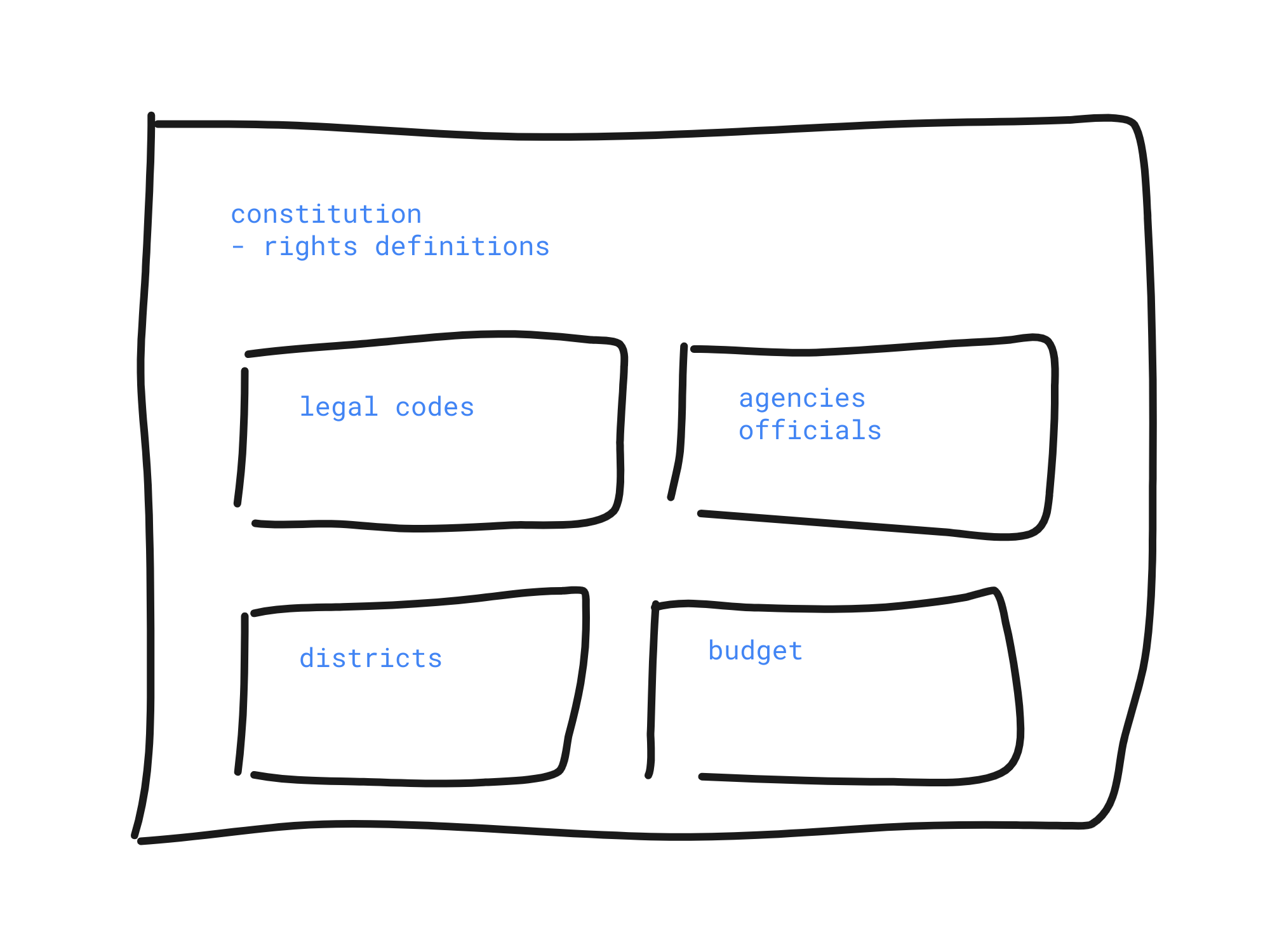
Constitutions can contain other constitutions much in the way nesting dolls contain other nesting dolls. You can write a constitution that allows "lower constitutions" to be created underneath it for more specific areas of decision making. Upper constitutions can limit the power of lower constitutions, such as to enforce rights or limit jurisdiction. This allows federated administration, and the very natural concept of subsidiarity.
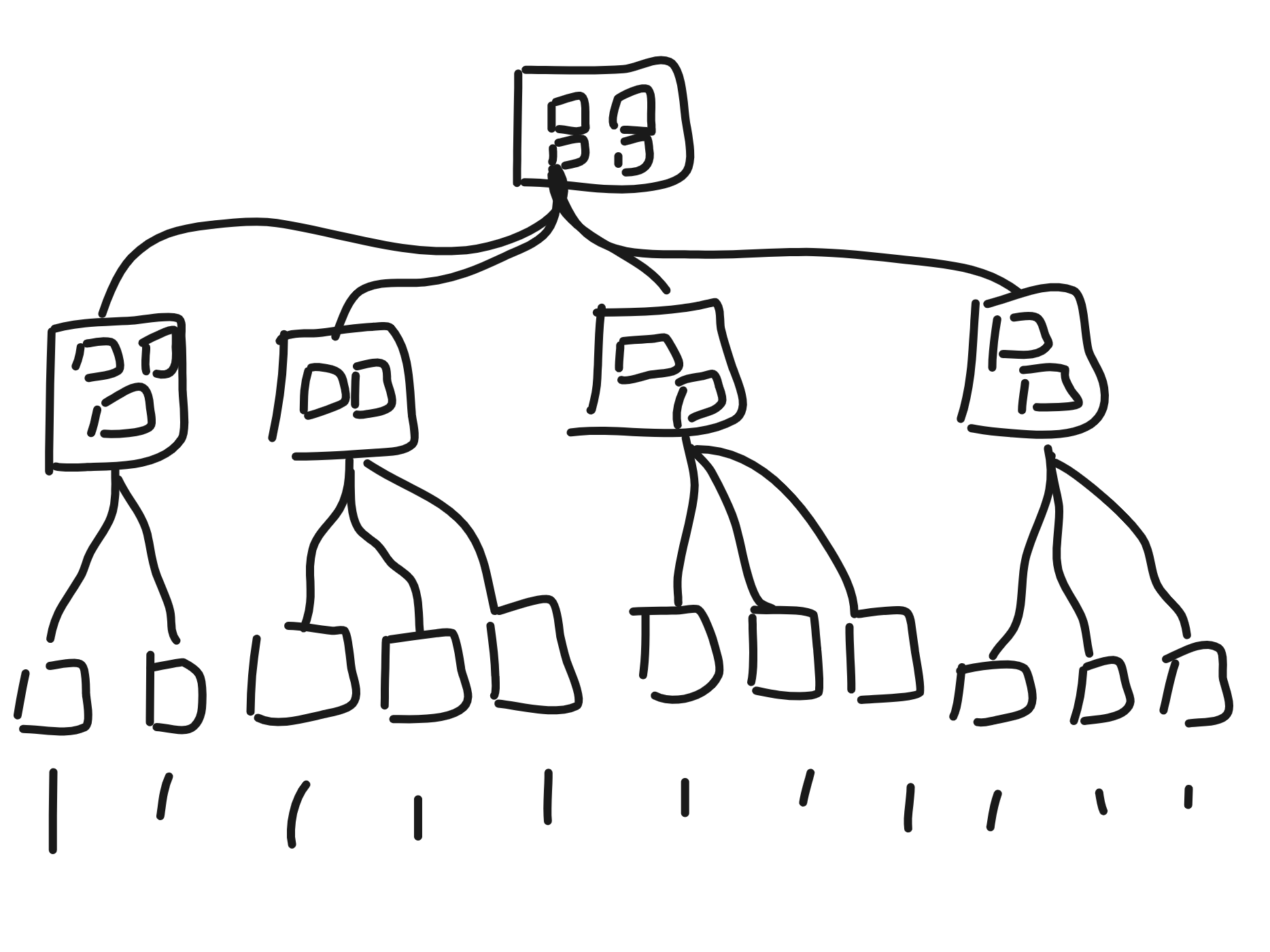
If you're curious about tricky questions such as "can a Adaptive Constitution be changed so it's no longer adaptive?", you should visit the detailed page about Adaptive Constitutions.
How are votes actually added up?
Adaptive Voting is just a different paradigm for thinking about voting, so it can be "wrapped around" any specific voting method to decide how to actually add up votes. Any inner voting method that can account for the concept of voting weights could technically work, but different voting methods have different qualities and so not all would be as effective.
If you're interested in the details of this question, check out these chapters:
- Why is our democracy broken? An introduction to voting methods and their rippling consequences.
- What is Quadratic Voting/Funding, and why does it work?
- Quadratic Range Voting - Combining the strengths of score and resource voting systems.
Adaptive Commitments
Not all decisions are reversible! Many of the most consequential decisions we make, such as all those that spend resources, are irreversible.
Adaptive Democracy can still be used to make irreversible decisions, it just has to do so more carefully. The whole point of Adaptive Voting is that it removes election deadlines, but with true commitments we can't avoid some sort of deadline. However we can mitigate the negative effects of deadlines by leaning all the way into the principles of conviction voting. Here's how a adaptive commitment works, visit the theory page for the exact details:
- Each commitment has a deadline. Some commitments are cyclical such as those for budget periods, but other commitments might only happen once.
- During the voting period before the deadline, voters can move around their weights to nominate and vote for "decision documents" that say what should be done in the commitment. For example a budget commitment would choose the budget document.
- However instead of using stabilization buckets and a current winner as is done in adaptive voting, particular choices instead accumulate votes as the deadline approaches.
- If a voter removes weights from an option, the accumulated votes move slowly from the old to the new instead of moving immediately.
- The winner is whichever option has most votes at the deadline.
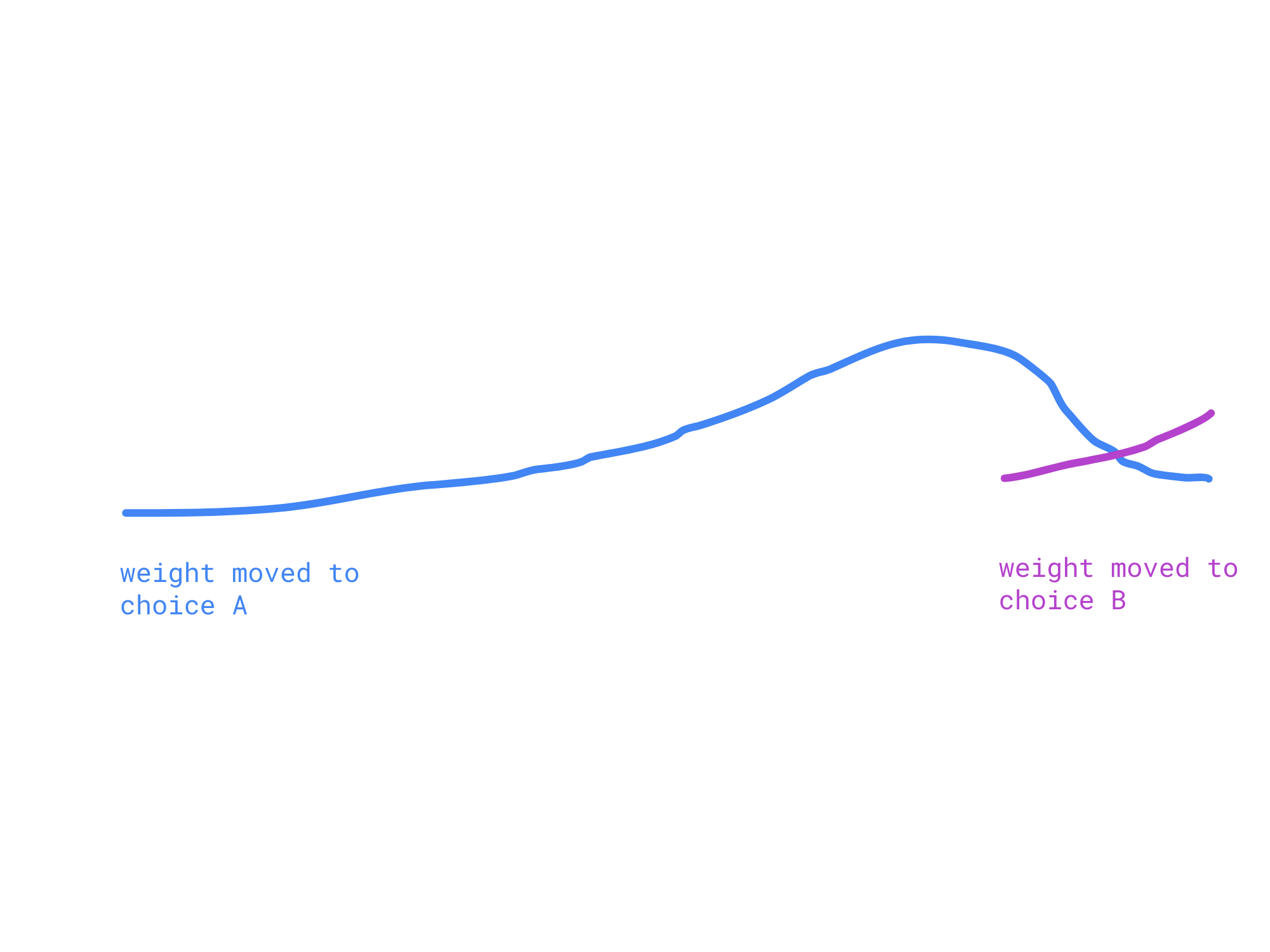
This process is designed to reward durable and consistent voting, and to prevent weird strategic swings or surprises right before the deadline. Since commitments have to be made more carefully we want to err on the side of choices that are better understood. It would likely make sense to require every commitment to have some safe "do nothing" option (such as always using the previous document for cyclical commitments or literally "do nothing" for one-time commitments) that accumulates votes as if all the non-participating voters selected that option with an equal division of weights across all elections.
Comparison with Liquid Democracy
Both adaptive and liquid democracy are really trying to achieve the same thing. Both want to make direct democracy possible by allowing every person to directly effect every group decision. Liquid democracy does this by allowing voters to delegate their votes to some other person, who can then delegate them again, and so on.

This system doesn't seem to offer any unique benefits that aren't also enjoyed by Adaptive Democracy, and could fall victim to a pretty nasty problem: "lazy demagoguery". Liquid democracy would make it easy for a voter to just delegate huge amounts of their votes to someone they shallowly like, such as a media personality, and never bother to check on what those votes are being used for. Those kinds of concentrations of voting power would be a problematic vulnerability, and are completely avoidable.
Adaptive Democracy just as powerfully supports delegation as liquid democracy, but in a simpler way: "delegation by abstention". If you don't care about an issue, or aren't confident you know enough about it to have a useful opinion, just don't vote on it and allow others to make the decision. You can always change your mind and move weights into that election at some later time. Stabilization buckets should be designed to make more important decisions take longer to change, giving you more time to notice them if you actually do care.
Nothing can change the fact that people will listen to others and be swayed by their opinions, so there will always be some amount of "delegation by persuasion". It's unnecessary to directly encode delegation into the system itself when we can just allow natural delegation in a simpler design. We ought to require that a voter actually changes their votes themselves, whatever that happens to mean in the specific context.
There are tons of specific details to get right when designing a completely new system for democratic decision-making. In this chapter I've already pointed to other detail chapters, but I'll list them again here, along with others I think you might find interesting at this point.
- Why is our democracy broken? An introduction to voting methods and their rippling consequences.
- What is Quadratic Voting/Funding, and why does it work?
- Quadratic Range Voting - Combining the strengths of score and resource voting systems.
- Adaptive Voting: open questions
- Adaptive Logistics
- Democratic Documents
- Adaptive Constitutions and Democratic Districts
- Public Goods and Cooperative Goods
- Adaptive Funding
- Computable Governance Code
- Cryptographic Transparency
- Adaptive Prioritization
- Adaptive Democracy Labs - Supporting Adaptive Democracy with research and development.
Otherwise, head to the next chapter!